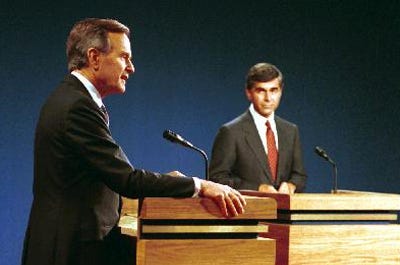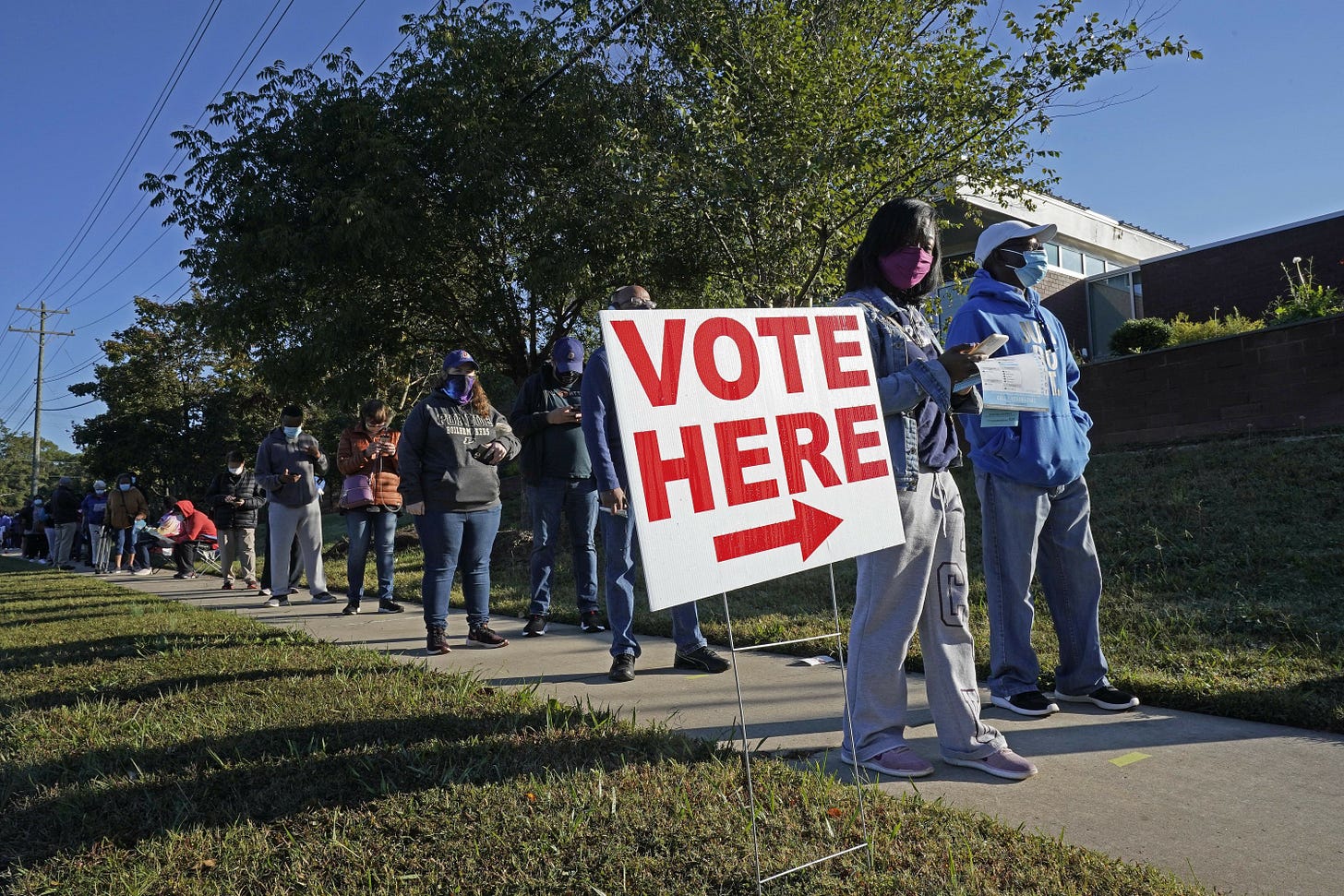Reality Check Time
Republicans are buoyant after their successful convention, compounded by Democrat’s civil war and despondency over their ticket. Time for a reality check.
I remember well watching television during a hot summer mid-August evening in 1988, probably CNN (Fox News didn’t exist until 1996 and the late Roger Ailes didn’t take over until 2001). It was the weekend before the 1988 Republican National Convention in New Orleans.

A Gallup poll had the Democratic nominee, Massachusetts Governor Michael Dukakis, leading Vice President George Bush by 17 points. Other polls had it closer, but not much. Democrats in August 1988, following their own successful July convention, were measuring drapes. I remember some saying that no candidate had trailed that much so late in the contest and won the White House, at least since 1948.
In 2024, you can expect to hear Democrats mention that election in this “darkest before dawn” moment, tables now turned, no matter who their nominees may be.
The ticket of Bush and his vice presidential nominee, US Sen. Dan Quayle (R-IN), would go on to win 426 Electoral College votes in a landslide, handily winning the popular vote and 41 states. I remember three things: Willie Horton, a horrible response to a debate question from CNN moderator Bernard Shaw about how he would react if his wife was raped, and video of him riding a 68-ton M1A1 Abrams Main Battle Tank at a General Dynamics manufacturing plant in Michigan. The tank video was used by the Bush campaign to underscore its hypocrisy given Dukakis’s support for reducing military spending. The diminutive Governor looked goofy in the photo op, dubbed by Politico magazine as “the worst photo op ever.”
The Dukakis campaign was one of the worse general election campaigns by a major party nominee in history. Bush’s campaign manager, the late Lee Atwater, was “credited” with orchestrating Bush’s scorched-earth media attack campaign. Atwater would go on to chair the Republican National Committee before succumbing to brain cancer during Bush’s one and only term.
To be sure, 2024 is not 1988. Not the candidates, and not the electorate. But the lessons are eternal.
A much bigger chunk of the electorate was more malleable then, especially compared to the hardened and polarized electorate we have today, not to mention the media landscape. So much so that Bush overtook Dukakis shortly after Labor Day and never looked back.
In 2024, I can’t imagine much of anything moving a substantial number of voters to prefer one candidate over another. So then, the campaign’s primary objective becomes getting their supporters to the polls. That’s critical, especially to “down ballot” races for the US Senate and House, along with a handful of state and local races.
While Donald Trump is no Michael Dukakis and Joe Biden (or anyone else) bears no resemblance to George H. W. Bush, this is your reminder that we’re still in the middle of July. A lot can - and will - happen between now and then that could change the political landscape, not unlike what’s happened in the past month. The June 27th startling presidential debate performance by Joe “sharp as a tack” Biden and last week’s assassination attempt on Donald Trump were on no one’s bingo card. We are still seeing the political fallout from both, and we may not know for weeks how it will shake out.
What other events lie in store? No one knows, of course, but it’s time for reality check. No one should get too excited or depressed about the continuing crisis that our national politics have become. Much has yet to unfold, especially among Democrats between now and Labor Day, maybe beyond.
This reminds me of an ice hockey analogy. A two-goal lead, they say, is the “worst lead in hockey.” It’s because the team that’s ahead tends to rely a bit on their “insurance goal” as the losing team digs deep and picks up their game - a false sense of security. And hockey, like politics, is known for sometimes wild shifts of momentum. Sometimes, it just takes one goal. It feels like Trump currently has a two-goal lead in his race to return to the White House.

This is your reminder that it is may be too late for Biden to remove himself from the ballot in as many as seven states, including Georgia, Nevada, and Wisconsin. Legal challenges are promised by the conservative Heritage Foundation (home of “Project 2025” that Trump loves to disavow). I promise a post about their 900-page set of policy recommendations, once I dig through it (may be awhile).
First, the fact is that polling numbers haven’t changed very much, both since the June 27th debate and even after the assassination attempt (that may need more time to “bake in”). Even when you substitute out President Biden for his running mate or another Democrat, there is a solid low to mid-40 percent in favor of the Democratic ticket nationally and probably in every one of the five to seven targeted states (Arizona, Nevada, Wisconsin, Michigan, Pennsylvania, and Georgia, possibly others). Very few polls have Trump hitting the 50 percent mark (but he’s close). That may look like good news to both Joe Biden and other Democrats, but neither ticket has shown much propensity to attract new voters or switch allegiances.
Generating a high turnout? That’s different.
Second, talk of a Republican “landslide” that delivers a GOP-controlled Congress is, at this point, hubris bordering on delusion. We’ll revisit that in late October once the down-ballot races are more “developed.” Do the “landsliders” not remember the 2022 mid-term election results, where GOP House and Senate candidates underperformed? It also assumes Democrats will be so depressed over their ticket that they stay home on Election Day, but remember how anti-Trump they are. That should not be assumed.
Never underestimate the ability of Republicans to seize defeat from the jaws of victory.
Also, voters have a habit of splitting their vote when they don’t fully trust the president they’re voting for. Ronald Reagan’s 525 electoral college landslide in 1984 failed to produce a GOP House of Representatives, nor gains in the US Senate (Democrats gained two Senate seats and recaptured control of the Senate just two years later). Democratic US House candidates won 52 percent of the national popular vote, losing only 16 seats to Republicans, who needed more than 40 to capture control.
In fact, while it’s way early, Democratic incumbent US Senators still hold consistent polling leads in nearly every state in which there is a highly contested race, including deep red Ohio and Montana. But polling at this level remains deceptive, since voters aren’t paying much attention to those races just yet. And this is your reminder that some polling is poorly if not maliciously contrived. This is the organizational and fundraising phase of the campaign. The name ID, issue, and contrast phases come after Labor Day, although early voting affects that in many places.
Pollsters have to weigh their samples based on how they project various demographics will turnout. That’s a huge amount of guesswork at this point, given what’s happening. Right now, following a convention, an assassination and still in the aftermath of an earth-moving debate, it’s not an easy time to do ballot testing on polls, other than for benchmark or to measure specific if temporary impact. They tell us little about what voters will do when the real voting begins.
Third, we don’t know what the Democratic ticket or their convention will produce. They will get their moment in the sun in about three weeks. Will there be a debate in late September, as currently planned with ABC news serving as the host? Who knows what that will produce. Voters will be paying attention, whether it’s watching a new Democratic nominee against Donald Trump or whether Joe Biden really is as enfeebled as he appeared in June.
Trump is running a very good campaign and is far more disciplined and less offensive and erratic than he was 8 years ago. He further benefits from the Democratic insider attempt to get Joe Biden to drop out of the race, despite his holding 3,900 delegate votes on the first ballot of their upcoming convention. Trump’s fundraising has now eclipsed Biden’s. The show trials and lawfare Trump has endured have solidified and not seriously affected his support, and in fact has been reinforced by the assassination attempt and grotesque levels of incompetence and negligence (let’s hope its not worse) from the US Secret Service. Democrats have thrown everything at Donald Trump - it’s hard to imagine what else they have in their back pockets short of another Butler, Pennsylvania, God forbid.
One thing is increasingly obvious. With a highly-polarized electorate, both parties are clearly running “base” elections, focused on turning out voters than trying to persuade what few “undecided” voters may exist (there may be more than you think).
We’ve never had an election quite like this one. The closing messages and perceptions are firming up, but are not final. Republican overconfidence and complacency are a danger. We’re barely past Act I of a three-act play.
Just ask President Mike Dukakis.







Excellent article - and a great clip of Brandon Holyby's incredible save.
The old Engllish proverb comes to mind: "There's many a slip 'twixt the cup and the lip,” which is especially true in politics and governance.